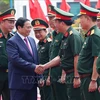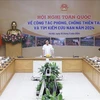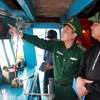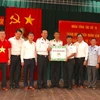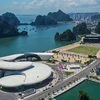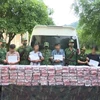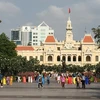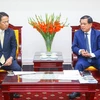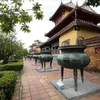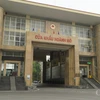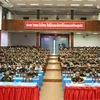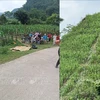There will be a free screening of French director Andre Menras's documentary on the Hoang Sa (Paracel) Archipelago at 53 Nguyen Du Street, at 3pm on July 11.
The 59-minute documentary, titled Hoang Sa Vietnam – la Meurtrissure (Hoang Sa – Painful Loss), features the life of Vietnamese fishermen who spend days and nights fishing in the sea and also guard the country's sovereignty over the sea and islands.
It also tells about their spiritual activities, involving the setting up ‘mo gio’ (tombstones without corpses buried) and celebration of festivals dedicated to the 17th century Hoang Sa Flotilla soldiers, who patrolled the Hoang Sa and Truong Sa (Spratly) archipelagos to tap natural resources and defend national sovereignty.
Director Menras, who is known as Ho Cuong Quyet in Vietnam, has French and Vietnamese dual citizenship. He taught French in Vietnam in 1968 and protested against the American War on several occasions in Vietnam and France. When the Chinese forces invaded Hoang Sa in 1974, Menras spoke against it.
He is both the playwright and the director of the documentary, in an effort to show his sympathy for the fishermen's hard life and fight against the invaders.
Menras will interact with the audience at the venue of the screening on the same day.
Historical and legal evidence has proved Vietnam’s undeniable sovereignty over Hoang Sa and Truong Sa archipelagoes. However, in 1956, China used force to occupy a cluster of islands called An Vinh of Hoang Sa Archipelago. In 1974, it swallowed the entire archipelago. And they did not stop there; in 1988, China used force to take hold of several reefs in Vietnam’s Truong Sa Archipelago.
These are invasive acts that seriously violated the sea and island sovereignty of the State of Vietnam and infringed the United Nations Charter and international law. They were not recognised by the international community.-VNA
The 59-minute documentary, titled Hoang Sa Vietnam – la Meurtrissure (Hoang Sa – Painful Loss), features the life of Vietnamese fishermen who spend days and nights fishing in the sea and also guard the country's sovereignty over the sea and islands.
It also tells about their spiritual activities, involving the setting up ‘mo gio’ (tombstones without corpses buried) and celebration of festivals dedicated to the 17th century Hoang Sa Flotilla soldiers, who patrolled the Hoang Sa and Truong Sa (Spratly) archipelagos to tap natural resources and defend national sovereignty.
Director Menras, who is known as Ho Cuong Quyet in Vietnam, has French and Vietnamese dual citizenship. He taught French in Vietnam in 1968 and protested against the American War on several occasions in Vietnam and France. When the Chinese forces invaded Hoang Sa in 1974, Menras spoke against it.
He is both the playwright and the director of the documentary, in an effort to show his sympathy for the fishermen's hard life and fight against the invaders.
Menras will interact with the audience at the venue of the screening on the same day.
Historical and legal evidence has proved Vietnam’s undeniable sovereignty over Hoang Sa and Truong Sa archipelagoes. However, in 1956, China used force to occupy a cluster of islands called An Vinh of Hoang Sa Archipelago. In 1974, it swallowed the entire archipelago. And they did not stop there; in 1988, China used force to take hold of several reefs in Vietnam’s Truong Sa Archipelago.
These are invasive acts that seriously violated the sea and island sovereignty of the State of Vietnam and infringed the United Nations Charter and international law. They were not recognised by the international community.-VNA
